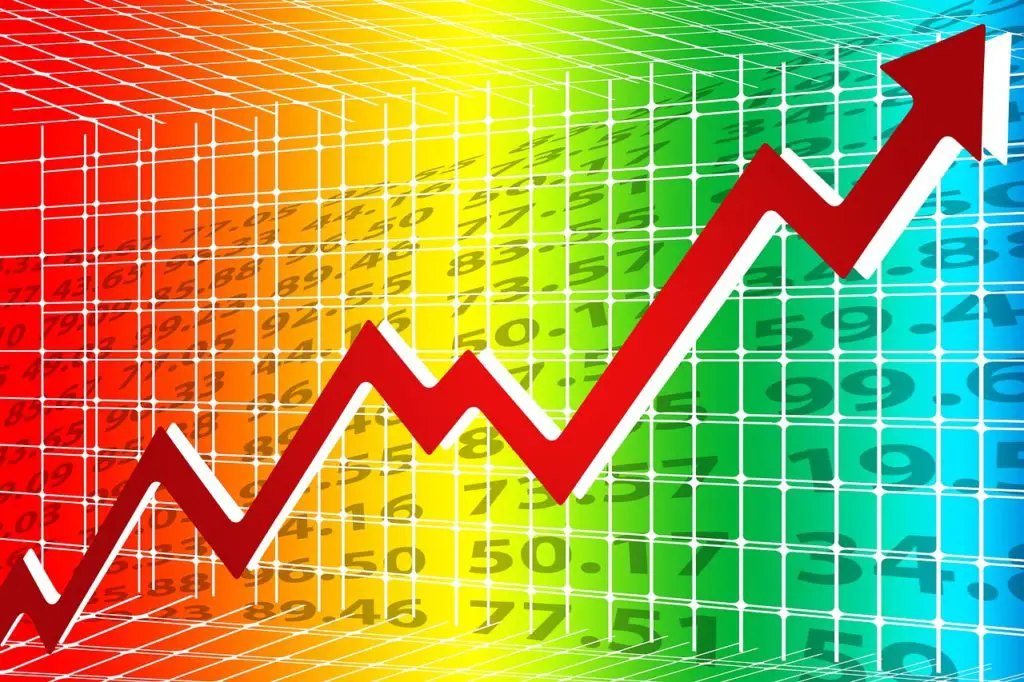Market capitalization (MCAP) is the market value of a company’s equity. Increased market capitalization is an important factor for companies but it can be affected by some factors; therefore, how does market cap increase? We will outline the factors that decrease or increase the market capitalization of companies with some examples.
What is market capitalization?
Market capitalization (or market cap) is defined as the market value of a publicly-traded company’s equity shares. It is the total value of the outstanding shares of a company; therefore, market cap can be calculated by multiplying a company’s share price by the number of shares outstanding.
For example, if Company XYZ has 4 million shares outstanding and its stock trades at $25 per share, then its market cap would be $100 million.
Market cap is one way to measure the size of a company. It’s also a way to see how much investor demand there is for a company’s stock. If Company XYZ’s stock price goes up to $30 per share, then its market cap would increase to $120 million. An increase in market cap usually means that more investors are buying the stock, which could be because they believe the company will be doing well in the future.
How does market cap increase?
The main factors that increase the market cap include the overall performance of the stock market, positive news about a company such as increased earning reports, or announcement of the launch of a new product.

Factors that can increase the market cap of a company
- The size of the company
- The sector or industry of a company
- Earnings report
- Increased demand for the company’s products or services
- Mergers and acquisitions
- Changes in share structure
- Changes in the overall economy
- Another way that market cap can increase is by paying dividends to shareholders. This attracts new investors and increases the market cap.
- The overall financial health of a company
The size of a company can increase the market cap
For example, a company that is large and has been around for a long time is likely to have a higher market cap than a small startup. This is because investors feel that there is less risk associated with investing in a well-established company.
Changes in the overall economy
When the economy is good, people tend to feel secure and therefore are bold to invest. This can generally increase the market cap of most companies. However, if the economy is bad or there is sudden negative news or event that affects the overall economy, then the market cap would decrease.
Macroeconomic factors such as inflation, interest rates, and GDP growth can all affect market cap levels. For example, if inflation is high, this will usually lead to a decrease in market cap as companies’ earnings are worth less in real terms.
An example of a change in the overall economy affecting the market cap can be seen in what happened in 2008 when the global financial crisis caused the market cap of many companies to plummet. For example, the market cap of Lehman Brothers fell to zero in just a few weeks. This was one of the largest and most sudden drops in market cap ever seen.
How does a dividend increase market capitalization?
A dividend is a portion of a company’s earnings that is distributed to shareholders. Dividends are typically paid out quarterly, and they can have a significant impact on a company’s market capitalization. When a company pays a dividend, its market cap increases because the value of the company’s shares increases. This is because shareholders now have a claim on the company’s future earnings, which makes the company more valuable.
However, there are some risks associated with dividends. If a company’s earnings decline, the dividend may have to be cut, which can cause the share price to fall and the market cap to decrease. Another risk is that dividends can be taxed at a higher rate than other forms of income, which can reduce the amount of money that shareholders receive; if an investor knows the tax on dividends is going to be high, he would simply avoid buying the stock and this can decrease the market cap overall.
Dividends are an important part of many investment strategies, but it’s important to understand the risks before investing in any stock.
The effect of mergers and acquisitions on market cap increase
When two companies merge, their market capitalizations are combined. This can have a big effect on the overall market, especially if the two companies are in different sectors. For example, if Company A and Company B merge, and Company A is in the tech sector while Company B is in the healthcare sector, this will create a new sector leader in healthcare.
This can have a ripple effect throughout the market, as other companies in the healthcare sector may see their stock prices increase in response to the merger. The same is true for companies in other sectors that may be seen as complementary to the newly merged company. For example, if Company C makes products that are used by Company A and Company B, then its stock price may also increase after the merger.
Investors will often pay close attention to mergers because they can provide insight into which sectors are strong and which sectors are weak. If there is a lot of merger activity in a particular sector, it may be an indication that the sector is doing well and that companies believe there is more growth potential. On the other hand, if there is little merger activity, it may be an indication that companies believe the sector has reached saturation point and that there is little room.
The financial health of a company can increase the market
This is probably the most important factor that determines MCAP. If a company is doing well and its profits are increasing, then its share price will also go up, leading to an increase in market capitalization. On the other hand, if a company is facing financial difficulties, then its share price will likely fall, resulting in a decrease in MCAP.
Increased demand for the company’s products or services can increase the market capitalization
If there is more demand for what a company has to offer, this will usually lead to an increase in its market cap. This could be due to population growth, new trends, and technologies, or simply increased awareness of the company’s existence.
Good earnings report
If a company is growing its revenue and profit, this will usually lead to an increase in market cap. This is because investors are willing to pay more for shares in a company that is doing well financially.
Changes in share structure: the impact of share repurchases on market cap
When a company repurchases its own shares, it reduces the number of shares outstanding and therefore increases its market capitalization. The effect is analogous to a reduction in the number of shares outstanding due to a buyback. The main difference between the two is that, in a buyback, the company pays cash for the shares, while in a share repurchase, the company simply retires the shares.
There are several reasons why a company might choose to repurchase its own shares. First, it can be a way to return cash to shareholders. Secondly, it can be used as a tool to help support the stock price.
When a company announces a share repurchase program, it typically results in an immediate increase in the stock price. This is because investors see it as a positive signal about the company’s future prospects. While share repurchases can have a positive short-term effect on the stock price, it is important to consider the long-term implications as well. If a company consistently buys back its own shares, eventually it will own all of its outstanding shares. At that point, there would be no more shares available for investors to buy or sell.
What are the impacts of a reverse split?
When a company does a reverse split, it means that they are decreasing the number of shares that are available on the market. This can have different impacts on the market capitalization, depending on how it is done. If the company redeems some of its shares, then the market cap will go down. However, if the company simply decreases the number of outstanding shares without buying any back, then the market cap will stay the same. In either case, the reverse split can have an impact on the price per share, and this is usually what drives investors’ decision-making when it comes to these types of events.
Importance of market cap
Market capitalization is important because it gives investors an easy way to compare companies of different sizes. For example, imagine that two companies have the same number of shares outstanding. Company A has a share price of $10, while Company B has a share price of $100. This means that Company B has a market cap of $10,000, while Company A has a market cap of only $1,000.
Companies with a higher market cap are usually worth more because they have more assets and/or earn more money than smaller companies. There are exceptions to this rule, but it is generally true.
How does market cap decrease?
When a company’s stock price decreases, the market capitalization of that company also decreases. This is because market capitalization is calculated by multiplying the current stock price by the number of shares outstanding. So, if a company’s stock price decreases but the number of shares outstanding remains the same, the market cap will also decrease.
There are a number of reasons why a company’s stock price might decrease, including poor financial results, negative news, or simply a general decline in the stock market. When a company’s market cap declines, it may be seen as less valuable by investors and its stock may become less attractive to potential buyers.
Conclusion
In general, market capitalization is a good way to measure the size of a company. It’s also a good indicator of how much a company is worth on the open market.
It is essential to know how market capitalization works and what factors can affect it. By understanding these things, you will be able to make more informed investment decisions. Hopefully, this article has answered your question of “how does market cap increase?”.
Last Updated on November 6, 2023 by Nansel Nanzip BongdapNansel is a serial entrepreneur and financial expert with 7+ years as a business analyst. He has a liking for marketing which he regards as an important part of business success.
He lives in Plateau State, Nigeria with his wife, Joyce, and daughter, Anael.
